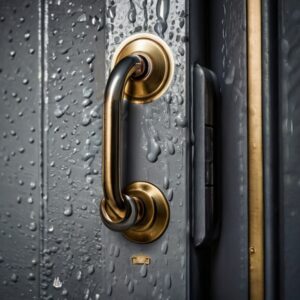As the seasons change and the weather shifts, many homeowners and business owners remain unaware of how these environmental changes can impact the security of their properties. From hot summer days to icy winter nights, various weather conditions can have significant effects on your locks and the overall security systems you rely on. Understanding these impacts can help you take preventive measures to ensure your property remains secure year-round.
Summer Heat

During the summer months, high temperatures can have a significant impact on the functionality of locks and their components. One common issue is that the metal parts within locks can expand due to the heat. When the metal expands, it can result in increased friction, leading to difficulties when turning the key or attempting to unlock the door. This problem is especially pronounced in older locks that may already be experiencing wear and tear from years of use. The additional strain caused by the expanded metal can exacerbate existing issues, making the lock even more challenging to operate.
Heat can evaporate or degrade the lubricants that are essential for the smooth operation of lock mechanisms. As these lubricants dry out, the internal parts of the lock can become stiff and resistant, making it harder to insert or turn the key. This phenomenon can lead to frustrating and time-consuming lockouts, impairing the security and convenience of your property.
Another concern during the summer months is the effect of ultraviolet (UV) rays on electronic keypads. Prolonged exposure to direct sunlight can cause the face of these keypads to fade, crack, or even malfunction. As the keys or the screen become less distinct, it can become increasingly difficult to input codes correctly. This issue can compromise the security system, as incorrect codes may prevent authorized access or trigger false alarms.
To mitigate these challenges, it is advisable to take proactive measures. Ensuring that your locks are shaded from direct sunlight can help prevent excessive heat exposure. Investing in UV-resistant covers for electronic keypads can protect them from the damaging effects of prolonged sun exposure. Such precautions can help maintain the integrity and functionality of both mechanical and electronic locks throughout the hot summer months, ensuring that your security systems remain reliable and effective.
Winter Chill
Cold weather can cause metal to contract. This contraction can make keyholes smaller, complicating the task of inserting and turning the key. In extremely cold conditions, moisture inside the lock can freeze, causing the lock to become completely immovable. Frozen locks are a common issue in colder climates and can pose a serious security risk if not promptly addressed.
To mitigate the risks associated with cold weather, it’s essential to keep locks well-lubricated with a de-icing lubricant. This can prevent moisture from freezing within the lock mechanism. Additionally, adding weather stripping around doors can minimize the amount of cold air and moisture that comes into contact with your locks.
Rain and Humidity
Locks are not immune to the effects of humidity and moisture. High humidity levels can lead to rust and corrosion, particularly in locks made of iron or steel. Rust can obstruct the internal components of the lock, making it difficult or impossible to turn the key. In coastal areas, salt in the air can accelerate the rusting process, compromising lock integrity.
Regular maintenance, including the application of anti-corrosion sprays, can help protect your locks from rust. Investing in high-quality, rust-resistant locks made from materials such as brass or stainless steel can also be a long-term solution to combat moisture-related issues.
Floods
Flooding is another weather-related issue that can severely impact locks and security systems. Water damage can ruin electronic locking mechanisms and keypads, rendering them useless. Traditional metal locks can also be compromised if submerged for extended periods, leading to rust and corrosion.
To protect against flooding, consider installing locks that are specifically designed to be waterproof and water-resistant. Elevating electronic devices, such as keypads and access control panels, above potential flood levels can also help mitigate damage during floods.
Seasonal Maintenance Tips
Spring
Spring is an excellent time for maintenance and to check your locks after the harsh winter months. Clean out any debris that may have accumulated in the locks and lubricate them to ensure smooth operation. Inspect your security systems for any water damage caused during the winter and address any problems immediately.
Summer
During the summer, regularly check the condition of your locks and lubricate them to prevent them from sticking due to heat expansion. Ensure that your electronic keypads and other devices are protected from direct sunlight to prolong their lifespan and functionality.
Fall
As temperatures start to drop, begin preparing your locks for the winter. Apply de-icing lubricant to protect against freezing and check that weather stripping around doors and windows is intact. Fall is also a great time to review and upgrade your security systems before the harsh winter conditions set in.
Winter
In the winter, keep a close eye on your locks to ensure they are not freezing up. Regularly lubricate with de-icing fluid and make any necessary adjustments to prevent locks from becoming stiff due to the cold. If a lock does freeze, avoid using hot water to thaw it, as this can cause further damage. Instead, use a proper lock de-icer to safely melt the ice.
